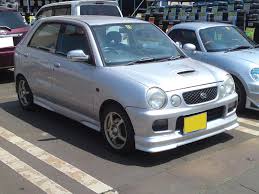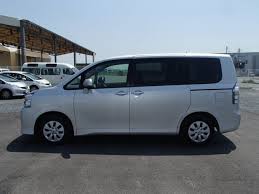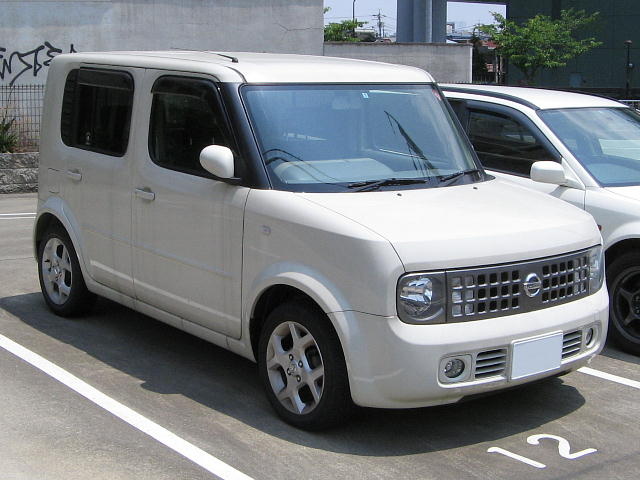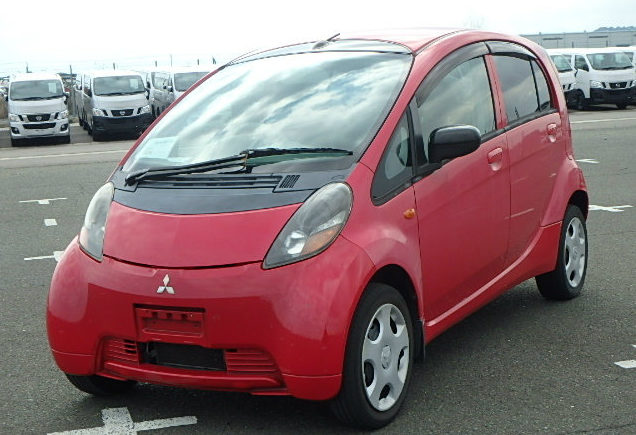There are no Cadillac Escalades in Japan. No Expeditions, Yukons, or Range Rovers either. Imagine all the super-sized and mid-sized SUVs and 95% of the CUVs (including CR-Vs and RAV4s) and take them off the road. Japan doesn’t have them.
There are a lot of kei or “mini” cars that look like this:

Daihatsu kei car
And there are quite a few sub-compacts like this:

Honda Fit
If you really need space, you get a Japanese mini-van (2/3 the size of a Toyota Sienna):

Toyota Voxy
And I have seen exactly one Subaru Forester, my former vehicle.
There are scores of options for sub-sub-compact to mid-size vehicles in Japan. Most models are made by Toyota, Honda, Nissan…car companies you’ve heard of. But if you live in the United States, you’ve never seen these models.
Why?
Perception. Americans perceive their need for space to be greater than Japanese do. The average American–even one without a family or pet or space-consuming hobby–would dismiss these cars without even sitting in the driver’s seat (which, by the way, is on the right side in Japan). Whether the perception is person-driven or auto-industry-driven is debatable, but the perception exists.
Space is at a premium in Japan. The approximately 127 million people in Japan live on just 19% of its land. The major roads, though, are roughly the same width as American roads. In fact, even if they were significantly narrower, car makers could just make longer cars to meet Japanese need, if it were there.
I came to Japan with an open mind and heart, and I’m spending a lot of mental and emotional capital on perceptions. Car size is hardly the most important example, but it’s an obvious one. Japanese still have kids who play sports with tons of gear. They have teens who travel in herds to movies and malls. They have pets and hobbies. They need space for all the things Americans need space for on a daily basis. Somehow, though, Americans perceive a need for more space. And not a little more space — a lot more space.
Someone I love dearly spent a great deal of time evaluating what kind of car he should buy by whether it would fit a ten-foot board. He perceived a need to carry a ten-foot board. In reality, he rarely, if ever, needed to carry a ten-foot board. But just in case…
And that’s at the heart of it, I think. Americans, with their rugged individualism and do-it-yourself mentality, are consumed by “just in case.” Just in case we have another baby, we need a seven-seater minivan. Just in case we remodel the bathroom, we need a pickup truck. Just in case…
I test drove a RAV4 three years ago and declared it “way too small” for our three person, two dog family. Granted, one dog weighed eighty pounds, but still. “Way too small,” I said. I sat in a Nissan Cube after four days in Japan surrounded by tiny cars and questioned whether it was too much space for our now three person, one dog family. If you’re not familiar with the Cube, it falls into the “bizarre” category of cars in the States along with the Kia Soul and Honda Element.

Nissan Cube
After forty-five minutes completely out of my comfort zone, I chose a Mitsubishi i, the smallest car known to man. It is so small, the engine is above the rear axle.

Mitsubishi i
Neat, right?
I forked over a deposit and headed home proud that I had chosen a car that’s about as Japanese as it gets.
And then I worried. For two days. First, I worried about my perceived needs. Would it really fit all my groceries if I made a once-a-week trip? Was it really safe enough for my son? Would my dog have enough space to be comfortable?
Then I worried about my perceived “just in case” scenarios. Did it have enough room just in case I need to carpool kids to school? Just in case we start tenting again and need to carry all our camping stuff? Just in case we want to take a road trip in a foreign country that travels long distances almost exclusively by rail?
Finally, I succumbed to my American perceptions. I called the seller back and asked if I could switch my deposit to the Cube: the vehicle that still feels too big in Japan, is a tiny CUV in America, and will definitely not haul a ten-foot board.
Perception.

We have downsized our needs to an 8 foot board. I lo e small cars but in the road with the huge tanks here in the US I am terrified to drive a really small car and I can’t find my car in the lot because it is surrounded by these huge cars. Still I think we can all downsized and be much happier with less stuff. It frees the mind to think about what’s important rather than worrying about how you will protect all your things that you do t need.